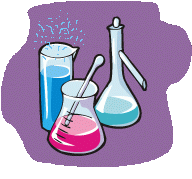


Description of experiment
Below follows a plain text transcript of the selected experiment.
![]()
Needed compounds:
-----------------
hydrogen peroxide : H2O2
hydrochloric acid : HCl
sulphuric acid : H2SO4
potassium metabisulfite : K2S2O5
copper sulfate penta hydrate : CuSO4 . 5H2O
Class:
------
elem=Cu
redox
Summary:
--------
Copper (II) is reduced by metabisulfite / sulphur dioxide to a copper (I)
compound, but some heating is required in order to make this reaction
fast.
Description:
------------
Add a solution of potassium metabisulfite to a solution of copper sulfate,
which is slightly acidified with a small amount of sulphuric acid (appr.
1 mol/l): The liquid becomes green/blue on addition of the potassium meta-
bisulfite.
Heat the liquid for a while to almost boiling: The liquid slowly changes
color, from green/blue to pure green, through yellow/green and yellow/brown,
until it becomes turbid at a certain moment. When the liquid is kept hot,
then finally a precipitate is formed, consisting of many crystal-like
particles, which sink to the bottom quickly. The liquid above the precipitate
is almost colorless (slightly yellow/brown) and has a strong smell of SO2.
Decant the liquid and keep the precipitate, add a large amount of tap water,
wait until the precipitate has settled again and remove the water again. Repeat
this step two times. Finally a red/brown precipitate remains in a small amount
of tap water. The color of the precipitate resembles that of some dark red
bricks.
Add some dilute HCl (a few percent of weight): The precipitate turns off-white
and a strong smell of SO2 can be observed again. When the liquid is shaken,
the precipitate dissolves and the liquid becomes light green/yellow/brown.
From this can be concluded that the precipitate is not copper, but a copper (I)
compound. Probably it is impure copper (I) oxide, but it may also be a mixed
oxide/ sulfite compound. This is because of the smell of SO2, when acid is
added.
Add some hydrogen peroxide (appr. 10% by weight): The liquid becomes light
blue.
![]()